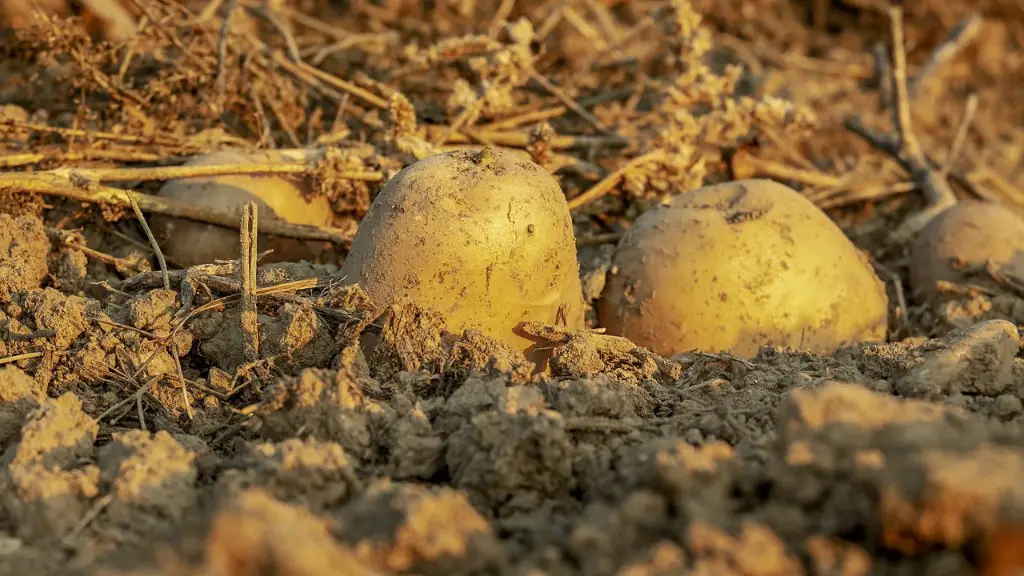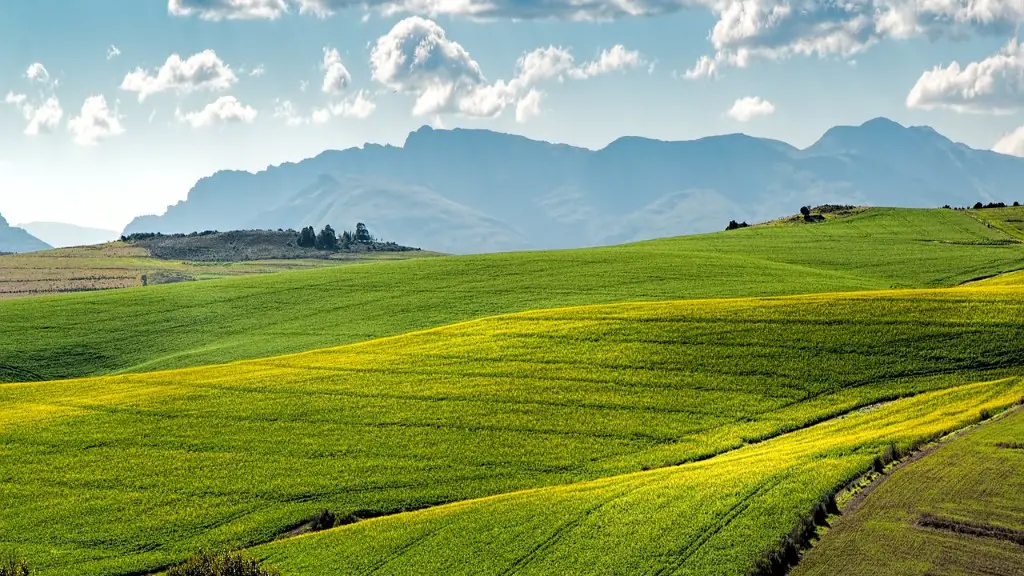Agriculture has always been an integral part of the global economy and continues to play a vital role in sustaining its growth. It provides an essential source of food for people around the world and is responsible for a large percentage of the workforce in many countries. Additionally, it has a significant impact on local and international markets and has the potential to create economic opportunities. From providing food security to increasing rural incomes and stimulating economic development, here are a few reasons why agriculture is so important to the economy.
The agricultural sector is essential for generating livelihoods, providing employment opportunities, and generating incomes. It provides employment to over one billion people in the world, helping to lift households out of poverty. In addition, agricultural production and trade also contribute to world economies by supplying labour intensive goods, generating foreign exchange, and providing a financial cushion to households who are too poor to cushion themselves against any economic shocks. Agricultural commodities also form the foundation of many countries’ export markets, making them important for the world economy.
Agriculture also plays a role in contributing to the global economy by producing food for the growing population. It is estimated that nearly 70% of global food production is dependent on agricultural input, including land, labour and innovation. As the world’s population continues to grow, the need for agricultural production will continue to increase, providing a steady source of income for farmers and creating food security for many people around the world.
Furthermore, agricultural production is a driving force for local economies and communities. Since many rural towns and villages depend on farming as their main source of income, the agricultural sector helps to provide economic and social stability to these areas. Farmers are able to purchase local goods and services, stimulating local and regional economies and providing an important source of employment.
Finally, the agricultural sector helps to maintain the environment by protecting natural resources and promoting biodiversity. Sustainable agriculture reduces the use of pollutants, chemicals and fertilizers, conserving energy and preserving the environment. This helps to reduce the negative impacts of climate change and protects water bodies, soils and essential habitats. It also prevents soil erosion, offers carbon storage and improves water quality.
Economic Aid and Employment Opportunities
Agriculture provides an important source of income, jobs and investment in rural areas, contributing to the overall economic development of the country. In many countries, agricultural aid and governments subsidies help to finance projects that support small-scale farmers, businesses, and cooperatives. This helps to provide economic stability in rural areas and creates employment opportunities, often leading to increased agricultural output.
In addition, trade in agricultural goods helps to create economic benefits for all those involved in the system. Lower-income countries are able to market their agricultural goods and earn foreign exchange, which can be used for further investment in the sector. As trade increases and contributes to the overall global economy, there is a corresponding increase in employment opportunities, as well as job training, technical assistance and business development activities.
Investment in the agricultural sector is also important for the development of the rural economy, as it helps to increase productivity, improve infrastructure and create employment opportunities. This increases income, stimulates economic growth and creates a value chain that benefits everyone in the economy, from farmers to exporters.
In conclusion, agriculture is an essential part of the world economy and its importance cannot be overstated. From providing jobs and income opportunities to contributing to food security and stimulating economic growth, agriculture plays an integral role in the economic development of many countries.
Agricultural Technology and Innovation
Agricultural technology and innovation play a critical role in maintaining the economic growth of the agricultural sector. With the use of modern technology, farmers are able to increase their efficiency and productivity, while also reducing their environmental impact. This includes using modern irrigation systems to conserve water, using new fertilizers and pesticides to increase crop yields, and using new machinery to reduce costs.
In addition to improving productivity, agricultural technology and innovation can also help to reduce poverty. This is achieved by providing training and education for farmers, helping them to become more self-reliant and better able to take advantage of opportunities available. This in turn leads to a reduction in rural poverty and helps to create an improved agricultural sector.
Innovations in agricultural technology also help to reduce the impact of climate change on the sector. Agricultural workers are able to access improved farming techniques, better technologies and more efficient systems, allowing them to better adapt to the changes in climate. This helps reduce the environmental impact and increase the resilience of agricultural production.
Furthermore, improvements in agricultural technology can help to improve food security, which is essential for economic growth. Proponents of agricultural technology suggest that, by increasing food production, there will be happier and healthier agricultural workers, as well as boosts to health and nutrition in the countries where the systems are in place.
In conclusion, advances in agricultural technology and innovation are essential for the overall health of the global agricultural economy. Through improved efficiency, productivity and resilience, agricultural technology helps to enhance the sector and provide economic stability to its participants.
Agricultural Policies and Reforms
The agricultural sector is greatly affected by government policies and reforms. Governments are responsible for establishing policies that support the growth of the sector and increase economic opportunities. These policies attempt to address issues such as food security, economic growth and environmental protection.
Agricultural policies may include land reform, which is aimed at providing access to land for individuals who may not be able to obtain it otherwise. This may include policies that allow for the redistribution of land for the use of the rural population, as well as policies that allow for the leasing or rental of land for the production of crops.
In addition, governments may implement agricultural subsidies to support the sector. Subsidies are often used to provide farmers with financial assistance for agricultural inputs, such as equipment and fertilizers, as well as for expanding or improving their production.
Lastly, agricultural reform and policies may include programs that support small-scale farmers, help to raise rural incomes, reduce poverty and promote gender equality. Policies such as these help to rectify some of the inequalities and injustices within the agricultural sector, while also helping to stimulate economic growth.
In conclusion, governmental policies and reforms are essential for the development of the agricultural sector. Through policies that address food security, economic growth and environmental protection, governments are able to support the growth of the sector and create greater economic opportunities.
Agriculture and Climate Change
Climate change presents a major challenge to global food security and agricultural productivity. Despite its importance to economic development, the agricultural sector is significantly affected by changes in climate due to its vulnerability to natural disasters and fluctuations in temperature and rainfall.
Agricultural production is vulnerable to extreme weather conditions and is particularly impacted by droughts and floods. In addition, changes in the climate cycle can create disruptions in the way crops are grown and harvested, resulting in lower yields, higher wages, and decreased trade.
The agricultural sector is faced with numerous challenges due to climate change, however, there are also opportunities. Moreover, investments in agricultural technology and innovations provide a unique opportunity to boost agricultural productivity while also reducing the impact of climate change. For example, farmers can use drip irrigation to reduce water usage and fertilizers to increase crop yields.
In addition, agricultural practices such as conservation agriculture and agroforestry, which involve the use of native and cover crops, can help reduce soil erosion and provide additional benefits such as carbon sequestration.
In conclusion, climate change presents a major challenge to global food security and agricultural productivity. However, with an increased focus on agricultural technologies and innovations, the sector can be more resilient to the changing climate and better positioned to provide food security and economic benefits to the world.
The Global Agricultural Economy
The global agricultural economy is an important driver of economic growth and stability around the world. It provides both direct and indirect economic benefits, by providing livelihoods, generating incomes and creating job opportunities in rural areas.
Moreover, the agricultural industry is a vital part of the global trade system, as it makes up a significant percentage of international trade. Hence, international trade in agricultural goods helps to create economic benefits for all involved, as well as investment opportunities in low- and middle-income countries.
Furthermore, the agricultural economy is also responsible for providing food security to many of the world’s people. As the global population continues to grow, the demand for food increases, and so does the need for agricultural production. By increasing agricultural productivity and providing a steady supply of food, the agricultural sector helps to ensure food security.
The agricultural sector also plays an important role in protecting the environment, as it helps to reduce the use of pesticides, chemicals and fertilizers. In addition, sustainable agriculture helps to conserve energy, reduce the impact of climate change, and protect water resources and essential habitats.
In conclusion, the global agricultural economy is essential for economic growth and stability, as well as food security and environmental protection. By providing an important source of livelihoods, jobs and investment, the agricultural sector helps to create economic opportunities and foster economic development around the world.





